

Viewing Bennett's Hierarchy from a Different Lens: Implications for Extension Program Evaluation. Introduction Bennett's hierarchy has been used for almost 35 years in Cooperative Extension.
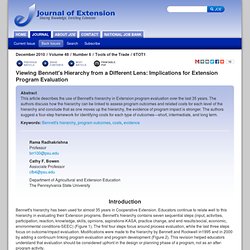
Educators continue to relate well to this hierarchy in evaluating their Extension programs. Bennett's hierarchy contains seven sequential steps (input, activities, participation, reaction, knowledge, skills, opinions, aspirations-KASA, practice change, and end results/social, economic, environmental conditions-SEEC) (Figure 1). The first four steps focus around process evaluation, while the last three steps focus on outcome/impact evaluation. Modifications were made to the hierarchy by Bennett and Rockwell in1995 and in 2000 by adding a continuum linking program evaluation and program development (Figure 2). Figure 1. Figure 2. Today, in a time of continued reduction in government funding, Extension professionals are challenged more than ever before to document outcomes of programs and address stakeholder demands for accountability. Figure 3. Possingham Lab - Publications.
Project Management. Fisheries. Evidence-based environmental policy. Environmental regulation. Parliament of Australia: Senate: Committees: Rural Affairs and Transport Committee: Exposure draft and explanatory memorandum of the Illegal Logging Prohibition Bill 2011. Draft illegal logging legislation referred to Committee- The Hon. Joe Ludwig - Minister for Agriculture, Fisheries and Forestry. 24 March 2011 DAFF11/105L Minister for Agriculture, Fisheries and Forestry, Senator Joe Ludwig, has today referred draft legislation to ban the importation of illegally logged timber to a Senate Standing Committee.
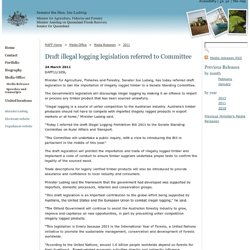
The Government’s legislation will discourage illegal logging by making it an offence to import or process any timber product that has been sourced unlawfully. “Illegal logging is a source of unfair competition to the Australian industry. Australia’s timber producers should not have to compete with imported illegally logged products in export markets or at home,” Minister Ludwig said. “Today I referred the draft Illegal Logging Prohibition Bill 2011 to the Senate Standing Committee on Rural Affairs and Transport. “The Committee will undertake a public inquiry, with a view to introducing the Bill in parliament in the middle of this year.”
“According to the United Nations, around 1.6 billion people worldwide depend on forests for their livelihood.
International forestry. Curb on forest use may cost Indonesia 3.5m new jobs a year. Moratorium now!
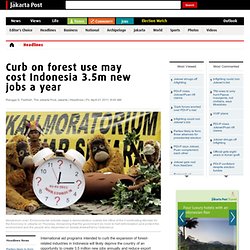
: Environmental activists stage a demonstration outside the office of the Coordinating Minister for the Economy in Jakarta on Thursday, demanding that the government do more to halt deforestation and protect the environment and the people who depended on forests.Antara/Fanny Octavianus International aid programs intended to curb the expansion of forest-related industries in Indonesia will likely deprive the country of an opportunity to create 3.5 million new jobs annually and reduce export revenues, a new report claims.
A report by the NGO World Growth released Thursday concluded that programs backed by international aid agencies including USAID and high-profile environmental groups such as Greenpeace and the Worldwide Fund for Nature (WWF) aimed at curbing forest conversion for commercial purposes would significantly hurt Indonesia’s economy. Logging in the wild west. Illegal logging of staggering proportions abetted by military personnel is decimating stocks of luxury rosewood in the Central Cardamom Protected Forest, while the conservation group tasked with protecting the area and its government counterparts deny the trade is even happening.
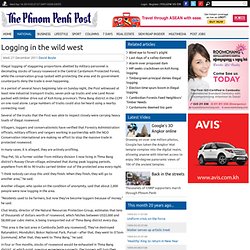
In a period of several hours beginning late on Sunday night, the Post witnessed at least nine industrial transport trucks, seven pick-up trucks and one Land Rover packed with timber drive out of Koh Kong province's Thma Bang district in the CCPF on one road alone. Large numbers of trucks could also be heard using a nearby connecting road. Several of the trucks that the Post was able to inspect closely were carrying heavy loads of illegal rosewood. Villagers, loggers and conservationists have verified that Forestry Administration officials, military officers and rangers working in partnership with the NGO Conservation International are making no effort to stop the massive trade in protected rosewood. Forestry company fined $5000 for illegal logging at Coramba. Seeing the wood for the trees: Kiwi lead in biodiversity conservation. In 1992-93, 168 countries including Australia and New Zealand signed the Convention on Biological Diversity (CBD) acknowledging an urgent need to halt ongoing decline in the planet’s biodiversity.
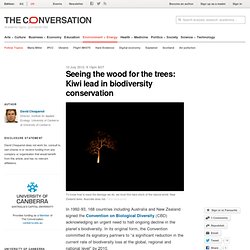
In its original form, the Convention committed its signatory partners to “a significant reduction in the current rate of biodiversity loss at the global, regional and national level” by 2010. Biodiversity continues to decline History is now a witness to the fact that by 2010 no signatory country could demonstrate significant progress toward meeting this target, with the principal pressures on biodiversity intensifying in many regions and countries over the reporting period.
Indeed, neither Australia nor New Zealand could mount an argument that they had made any more headway than the rest of the world, although New Zealand at least recognized that the absence of effective monitoring made any other conclusion difficult to draw. New Zealand’s biodiversity information system Comments welcome below. Brushy Creek Timber.